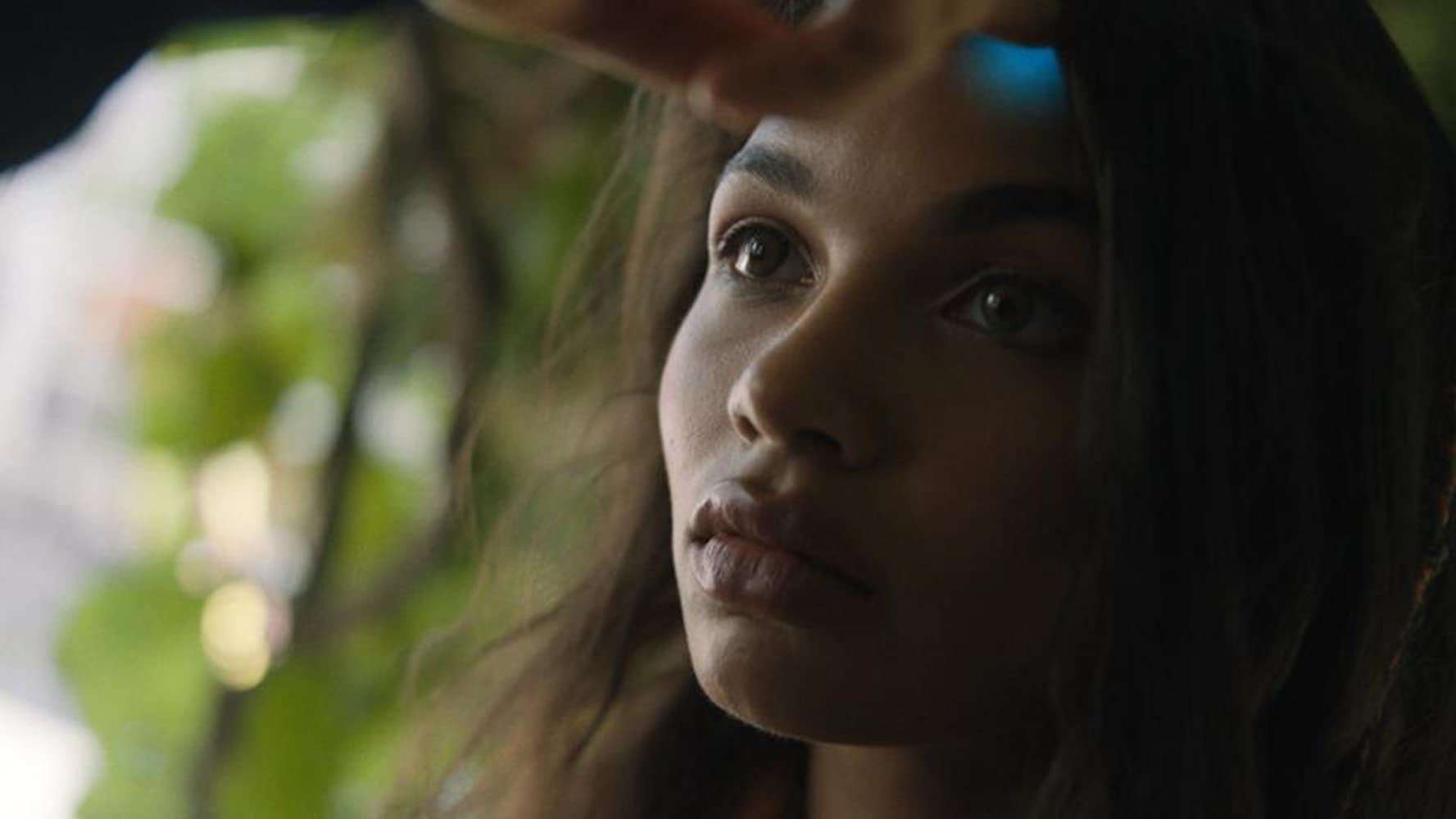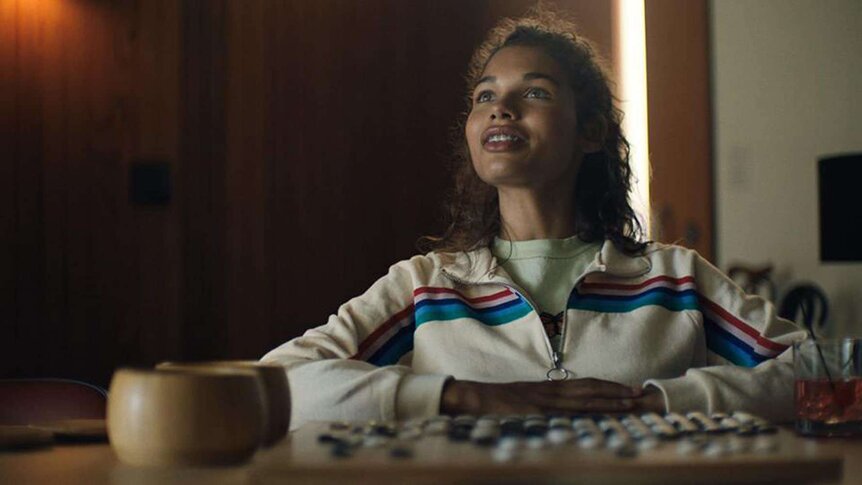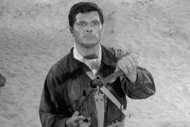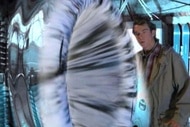Create a free profile to get unlimited access to exclusive videos, sweepstakes, and more!
Quibi's Don’t Look Deeper looked to Mary Shelley's Frankenstein and Ex Machina for A.I. eeriness

Advanced Artificial Intelligence is the norm in the world of Quibi’s Don’t Look Deeper. Hyper-intelligent bots roam the hallways and do their level best to assist heroine Aisha in the near-future sci-fi drama from creators Charlie McDonnell and Jeffrey Lieber. Little do these AI know that Aisha, played by Helena Howard, has more in common with them than they think. And as Aisha dives deeper into her own troubled origin story, she’ll grapple with questions about her own humanity, and that of the AI around her.
Ultimately, Don’t Look Deeper is a story about identity, creation, and what it means to be human. It’s a tale that’s been told countless times, and which McDonnell and Lieber were determined to tell in a new way. As McDonnell explains to SYFY WIRE, he and his co-creator found themselves grappling with questions about how to make the story unique from its contemporaries. “What do we like about this? What is unique to our story that makes it worth telling even though it exists in this genre that lots of people have explored before?" he says. They found their answers not so much in the story they were telling but in the way they chose to tell it: through the kind of short, to-the-point episodes Quibi has specialized in since its launch in April.
But Don’t Look Deeper didn’t start out with Quibi in mind, despite it having been written in 10-minute increments. “Just as Quibi was starting to buy, we were probably the only one in all of Hollywood who had already written what they were doing,” Lieber says. The pair had already been in contact with “a different network” that was also working on short-form episodes, and, as McDonnell explains, he’d always envisioned the show as more of a web series.
“We decided to pitch to [Quibi], not giving away that we'd already written it,” Lieber says. “We pitched it with a level of specificity and at some point during that meeting, [someone] cocked their head and said, ‘Wait a second. This exists, doesn't it?’ We smiled and said, ‘It might exist.’ Part of the reason we were one of the first shows to go is that we had already done what they were doing and we had done it intentionally.” Meanwhile, other Quibi projects were full-on films that had to be adapted to make sense in Quibi’s minimalist world.
“We had gone in to create serialized, 10-minute content and we happened to have done it just at the moment that Quibi started buying serialized, 10-minute content,” Lieber continues. “I think that was a really good match and it's part of why I think it'll be successful in a certain way, because, again, it was always intended to be exactly what it is.”
SYFY WIRE spoke with McDonnell and Lieber about Don’t Look Deeper’s origin, Frankenstein-adjacent inspiration, and Quibi’s “quick bites.”
Could you tell me a little bit about where the idea for Don’t Look Deeper stemmed from?
Charlie McDonnell: It started with me. I have an odd background. I was a YouTuber. That was my job and career for almost 11 years. I started when I was a teenager and as I got older I was having something of an identity crisis. I was grappling with the fact that this persona that I created when I was 16 was something that I was still performing as an adult. I wasn't being the person that I was in real life online and so I was really interested in stories about identity. Obviously, Aisha's story is much more heightened than mine, but that's where the idea initially started from, is really wanting to explore those ideas. Then when I brought the idea to Jeffery, he came in with a perspective of a parent.
Jeffrey Lieber: I have two kids who are now almost 16 and just 18. What Charlie was working on, from his point of view, translated to me into how does one parent someone who you gave the programming to and you gave the DNA to, and you are hoping that they will achieve their own machine learning and leave you. Once you have a piece of technology that doesn't know it's a piece of technology, how is that any different from a child?
I think the two of us work really well together because I was coming at it from one direction, which is my feelings about how to allow a child to become an adult, and Charlie was coming from a lived experience of coming to consciousness and realizing that he created a version of himself that everybody had taken in and that maybe that wasn't exactly who he wanted to be.
There have been so many stories throughout the years that touch on identity and what it means to be human, but were there any stories in particular that you were looking to for inspiration? Anything that had you saying, “That’s what we want to do?” or “That’s what we want to avoid?”
Lieber: I don't know if we were trying to do that. I know that we were trying to avoid... Or at least I was. Charlie can speak for himself. We try to avoid this being a commentary on technology. It's why you try very hard to set the show in a world that looks essentially like the one we exist in, because once it becomes about technology itself it's easy for people to dismiss it as being other and her as being other.
Frankenstein, if you want to go way back to the genesis... Mary Shelley's stories about identity and about creation and all these sorts of things and the responsibility that we have when we bring something into the world. That, to me, was, from a literary standpoint, the center of where we were coming. We just wanted to make sure that it was always about what happens to a person when they realize that their birth story is not totally honest.
McDonnell: I spent a lot of time watching a lot of films that centered around artificial intelligence characters where the AI wasn't necessarily the bad guy. Films like Ex Machina and even the [A.I.] Artificial Intelligence film, the Spielberg film. I agree with Jeffrey. I think the technology is a secondary aspect, but just wanting to look at the genre and be like, "What do these stories do? How are they [different] and what is unique about our story?"
Lieber: In this show, unlike most other AI shows, a piece of AI is not ever seen as a threat from a “they're going to want to shoot us” standpoint. The threat there, as articulated later on the show, is if we no longer can trust what is human and what is AI, we will no longer be able to trust ourselves at all.
Again, as opposed to going down the technology route, whereby we question whether the technology is a problem, we try to stick with the problem with technology is with the humanity of it all and that once we can't figure out what's real, what's not, we won't trust anything at all. Again, we constantly try to go back to use the technology as a way to talk about humanity.
Were there any moments in which you were looking into the "real science" of AI?
McDonnell: I ended up reading that Superintelligence book [by Nick Bostrom]. Again, none of this stuff really comes into the text of the show. We were wanting to make sure that we had an understanding of if this technology was to exist, how would it work?
That it would be the creator of the technology is not necessarily writing every single line of code that makes the person. A lot of that is coming out of the self-learning that the machine is doing and it's building its own codes in a way. We kept a lot of that stuff in the back of our minds as we were thinking about it, but ultimately it always came down to the question of the show: Aisha's humanity. We always treated her and saw her as human, if that makes sense?
Lieber: The thing for me that was something to steal from reality is the sense about people who make tech. The sense of, "Can I do this? Can I do this?" I don't know how deep you are in the show, but with the Sharon character, who is the mother of Aisha, a lot of what interested me was just simply how, in this tech world, these very smart people start heading down a road.
The question is, "Can I do more? Can I do more? What else can I do? What else can I create?" That spirit of the way technology... which is both really, really useful, because it's why we have such great invention, but also sometimes the, "Can I?" gets way ahead of, "Should I?"
What’s the benefit of working in this short-form episode way? Because it's so very different from what people are used to, and Quibi’s seen some problems along the way.
Lieber: As someone who does a lot of long-form TV, which is 42 and a half minutes, it's inevitable for 42 and a half minutes, if you're going to have filler, because the muscularity to create 42 and a half minutes 42 times a year, or some version of that, requires you just to get on the train and ride.
When we were sitting there, working 10-minute episodes, we were doing more haikus, which is that every [episode] will matter and we'd write the episodes and we'd realize we're 12 pages in and we're like, "What is the two and a half pages we can get out that's not necessary?" So you're constantly asking yourself what is primal to the story, what is necessary to the story and what is the most interesting?
I do think that in a world where there's just a ton of stuff and it can be overwhelming to try to take on hours and hours of stuff, to have material that you can digest in a few moments, you can feel has a beginning, middle, and end, and then you can look forward to again, there's something about it that feels super freeing, I think, to be able to know that you can watch this thing and you can enjoy it and you can have an experience, but it doesn't have to cause you to maybe not speak to your family in the process.
McDonnell: I feel like as a viewer as well I know I watched a lot of stuff on YouTube, starting way back when, and videos have just gotten longer and longer. I watched about a half-hour video about video games on YouTube this morning, absentmindedly, and I really find myself appreciating those time limits when it comes to content that you consume incrementally throughout the day.
I also watched the most recent episode of Don't Look Deeper on Quibi today just to see how it looks, make sure it was all going up all right and there's something more intentional about making shorter... You know you're coming into this short amount of content, you know how long it's going to last and then you can go do something else with your day, and I appreciate that.
Don't Look Deeper is now available to stream on Quibi.



























